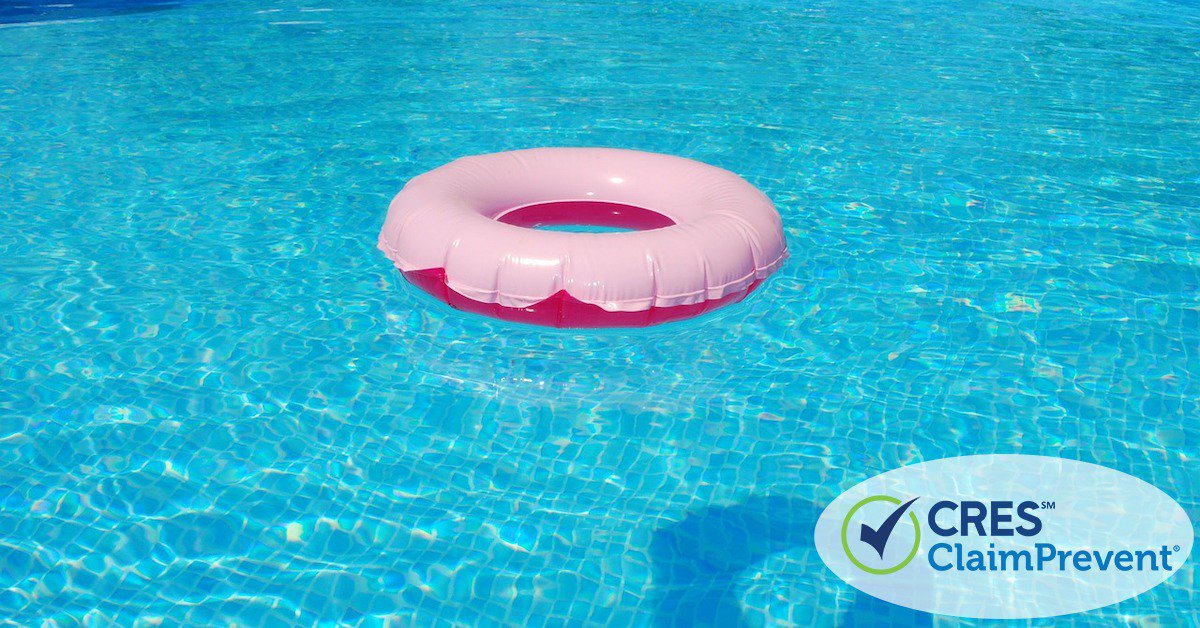Swimming pools are becoming more popular as families look for recreational activities in their own backyard. Since the pandemic, orders for pools have skyrocketed in the United States, as consumers look towards home-based activities they can safely enjoy at home.
Above-ground pools are slightly less popular than in-ground pools in the US, but they’re relatively affordable and easy to install in comparison. Unfortunately, some above-ground pools are being installed under the radar of authorities, because they’re portable/temporary pools. It’s something real estate professionals need to be aware of if you’re trying to sell a home with an above-ground pool.
Here are some tips so you know what to watch out for and strategies you can implement to minimize your chance of facing a lawsuit….
Check if the Above-Ground pool Has the Appropriate Permissions
As a real estate professional, you need to be confident the property you plan to sell has no encumbrances. Can you imagine if you sell a home, and then the buyer discovers they need to remove the above-ground pool because it’s an unauthorized structure?
To avoid facing a lawsuit, don’t make any assumptions about whether a pool has the required approval. Ask the seller and cite the documentation which confirms permission from the relevant authorities was granted.
Consider compliance for fencing and access gates as well. Many states, including California, Texas and Arizona, require a safety barrier or fence to be installed around the perimeter of backyard pools, and there are minimum standards for access gates. That is in addition to regular backyard fencing. Barrier fencing aims to stop small children from accessing the swimming pool and preventing drowning accidents. Above-ground pools must adhere to state and local pool codes if they hold water 18 inches deep or greater.
Look for Obvious Safety Risks
As a real estate agent, you don’t want to be in a situation where a buyer sues you because an above-ground pool has major safety issues. While there’s no obligation for you to pay for a pool inspection, watch out for any obvious safety risks. For example:
- A diving board when the pool is quite shallow
- Steps in disrepair
- Damage to surrounding decking (if applicable)
Also look out for any potential hazards like flooding, which may impact your open houses and showings. A flooded home isn’t good for business!
Disclose. Disclose. Disclose.
You must disclose any major issues regarding the pool condition. Pool repairs can be expensive. Buyers will not be happy if they find a major problem post-purchase which should have been disclosed.
If it’s an issue that will cost the buyer money in the future, if it’s a safety issue, or if it’s something that materially affects the value and desirability of the home, it must be disclosed to the prospective purchaser.
Don’t Provide Advice Outside of Your Expertise
As a real estate agent, buyers are likely to ask you a raft of questions about the above-ground pool. For example, “Does the pool add value to the property price?” or “What have properties with similar pools sold for in the area?”
These are questions a real estate professional is qualified to answer.
But, what if a buyer asks questions you are not qualified to answer? Such as:
- What do you think it will cost to maintain?
- How often can I expect to do repairs?
- How long will this above-ground pool last?
- Do you think the pool will be safe for my toddler?
- Is it deep enough to dive in?
- How much would it cost to remove the pool if I decide I don’t want it?
- Will the pool affect my insurance?
The only sure way a buyer can find out answers to these questions is to do their own due diligence.
Encourage Buyers to Do a Pool Inspection
In the same way that you encourage buyers to do a building inspection on a house, encourage buyers to do a pool inspection if the home includes a pool. An inspection by a fully qualified pool inspector will arm buyers with the information they need to make an informed decision about the property purchase.
Be Clear About Whether the Pool is an Inclusion in the Contract
As some above-ground pools are portable and temporary structures, you need to be very clear in the listing contract and the listing itself as to whether it’s an inclusion or not. You don’t want a buyer calling your office and asking where the above-ground pool is after settlement.
When making decisions about such issues, courts will often look at the ‘method of attachment’. If an above-ground pool is surrounded by a permanent structure, it may be considered a fixture. If it’s not, and can be easily removed without damage, it may be considered a removable personal property. However, it’s best if you simply avoid legal troubles altogether by ensuring the sales contract is clear.
Protect Yourself With CRES E&O Insurance
Smart real estate professionals have E&O insurance to protect their business and reputation. Sometimes the simplest of misunderstandings can result in a costly lawsuit.
CRES is a real estate E&O specialist. We can find the best policy to meet your specific needs. And with CRES E&O Insurance + ClaimPrevent®, you’ll have access to pre-claim expert legal advice 7 days a week. So you can deal with potential legal issues before they become lawsuits.
Contact the CRES team today at 800-880-2747 for a confidential discussion.
Read more on our ClaimPrevent® Summary: Real Estate Licensee Responsibilities When Creating New Listings
